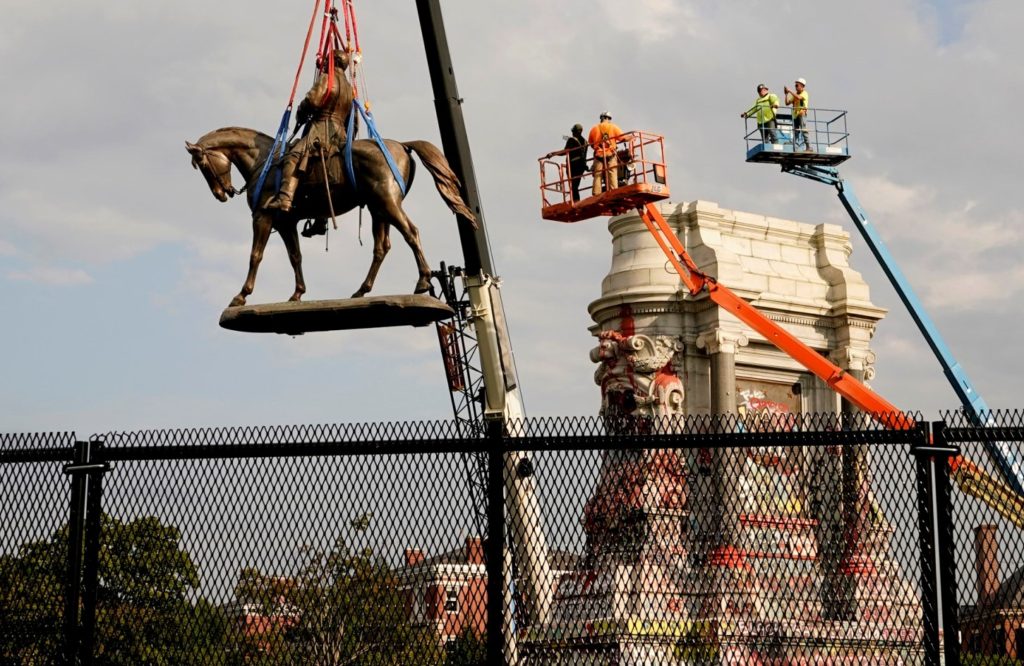Commentary
I know, like me you’re probably tired of reading about statues of past leaders being torn down, or in many cases, simply removed. So, why am I writing about it again?
Earlier this month, a story about the removal of another statue of Robert E. Lee landed in my stack of stuff, potential future material for this blog. Shortly, you’ll understand why.
This week, a friend sent me an e-mail about that statue removal with a brief background on Robert E. Lee, written by Carl Jones. He wrote of Lee’s graduation from West Point and told of his educating slaves he had inherited, and setting them free.
However, it was the last paragraph in Jones’ piece that motivated me to write this commentary:
“That a monument to this man has been taken down is a monument itself. The barren space where his memorial stood is a testament to the depraved depths to which the morality and character of our society has fallen.”
Now, about that article from my stack of stuff.
The headline, “Virginia’s Robert E. Lee statue removal is a victory for activists,” was rather straight forward. It was a pull-out quote, however, that demanded my response.
“Black residents had to walk past the statue and see a constant reminder of how white supremacy continues to shape American life.”
Not surprising, the author of the opinion piece was Keisha N. Blain, a contributor to MSNBC, who holds a Ph.D. in African American history. She is a believer that systemic racism exists in America.
She expressed disdain for those who embrace a distorted view that Confederate monuments hold some value, to honor what they call ‘Southern pride and heritage, insisting that the Southern states were fighting for the right to enslave human beings.
Blain writes of how blacks have had to walk past this statue in Richmond since its installation in 1890, and how generations of activists have worked to rid it from its very public perch in a traffic circle.
Embarrassingly, she credits the police killings of George Floyd, Breonna Taylor, Tony McDade and other blacks last year, with reigniting the debate over the Confederate monuments, “demanding the removal of these white supremacist symbols.”
Surely, Blain would scoff at Jones’ above quote about the “morality and character” of those who sought to have the statue removed.
Devon Henry, a black executive, of Team Henry Enterprises, faced death threats for his role in removing the statue of Lee and other Confederates previously removed from the site.
Thinking about those who, for years, protested over the statue, as I viewed photos of the graffiti-defaced base of the statue, I was reminded of the current effort to rewrite history with critical race theory. How will Robert E. Lee be remembered?
The removal of the statue is the latest consequence of a culture obsessed with imaginary systemic racism, noted Phil Leigh in “Robert E. Lee and Race Obsession,” in Civil War Chat.
“Razing the Monument Avenue statues will do nothing to lift black self-esteem, and it will not advance the status of blacks, but may deepen the racial divide with those who admire Robert E. Lee’s leadership qualities,” wrote Leigh.
“We’re sort of peeling back the layers of injustice that black people and people of color have experienced when governed by white supremacist policies for so long,” said Ana Edwards of Virginia Defenders for Freedom, Justice and Equality.
Will Richmond’s blacks really view the barren space where the 21-foot-tall bronze statue of Robert E. Lee once stood for more than 100 years as the site of victory over white supremacy? If so, it will be seen as a hollow victory.
My editor asks … does anybody care anymore?
Now, more than ever … may God continue to bless the United States of America.







